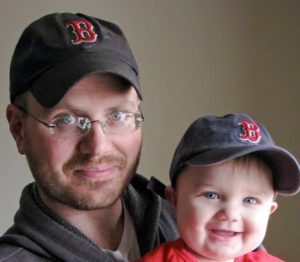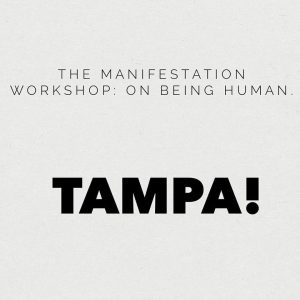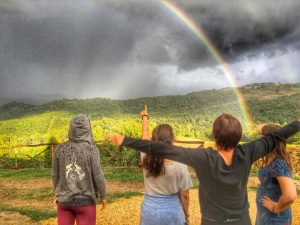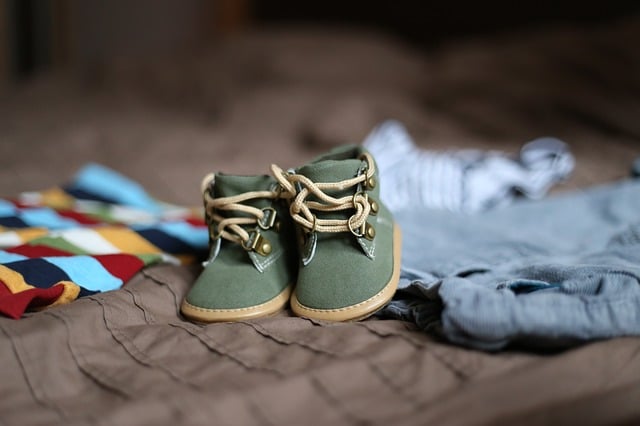By Steve Edwards
Early on there were nights I thought my son might die, and I thought it might be better for us all if he did. If on those nights his crying ebbed and his breathing stilled, I would lie in bed waiting, listening, the way you lie and wait and listen if you suspect an intruder in the home. I imagined Rebecca at the funeral, out of her mind with grief, and how in the days that followed sorrow would be all we knew, until one day—years later, perhaps—we would have made our peace with what had been taken from us. I kept this to myself and it skewered me because I loved my son like nothing else.
Had he been born with some physical problem? Some incurable disease? No. Aside from mild jaundice and a hemangioma, the doctors pronounced him perfectly fit and we brought him home to begin the life we had been imagining for so long. The life of a happy, healthy, and loving family.
The trouble started that first week when Rebecca’s milk didn’t come in. We bought the special nursing pillow, the pumps and bottles. We went to a lactation consultant. Maybe our son wasn’t sucking right, getting a good seal. Or maybe Rebecca needed to pump more often. Or maybe, the consultant finally suggested, Rebecca was suffering post-partum depression and wasn’t trying hard enough. Not ten days before, Rebecca had had a completely natural childbirth—not so much as an aspirin crossed her lips during labor or delivery—and it wasn’t painful, she assured me, but joyful, full of love. And even that first night in the hospital, when our son couldn’t stop crying and we didn’t have a pacifier: I stood by his crib and let him suck the tip of my thumb for over an hour because somewhere in our copious preparations we had read that this might comfort an infant. My wife and I are people who try our hearts out. But you can’t try to make milk come in. It comes or it doesn’t.
When our son began experiencing colic-like symptoms—“inconsolable crying, distress, irritability, sleeplessness”—our pediatrician told us we had gotten unlucky but that it would pass. We tried to laugh it off. We smiled through our tiredness and the well-meaning comments and teases from family, friends, elderly checkers at the grocery store: about how hard it is, how it would get better with time. We looked forward to when he would surprise us by sleeping the night.
As the first wearying, wondrous days of his life turned into weeks and months, an edge crept into his voice. He started screaming. He screamed every day, screamed, at such a high pitch and volume that if he screamed as I held him on my shoulder after a feeding, my ears would ring for hours. He was a shrill, writhing knot of muscle. Still too young to lift himself up on his arms, he somehow found the strength to buck his entire body away from us. We laid him on the changing table, on a blanket on the floor, on a couch cushion, on a chair, and we turned on ceiling fans, radio static, music soft and loud, and always—his face puckered and red, his tiny hands curled into fists—he wailed. Often without shedding tears. During the first snowstorm of his life, I rushed him outside thinking the dizzying zigzag of snowflakes might calm him down. It didn’t work. Nothing worked. In our exhaustion and fear, Rebecca and I argued bitterly until we lost even the words to say why we were mad or what was happening to us. Or to him. Or what we should do now. We were attached parents—devoted, gentle—and we never once touched our son in a way that wasn’t loving. But as three months turned to six, nine, and twelve, an instinctual, insuppressible rage sometimes welled up in me, and I slammed doors, kicked over chairs. On bad nights it took everything I had not to bend down and scream shut up into his little face. Not to fling him across the room.
At the doctor’s office we put on a brave front and did not complain. Down deep, of course, we were incredibly scared. After having dragged ourselves in multiple times for vaccinations and well-checks that provided no remedy or respite, we debated: Should we go again? Will they be able to tell us anything this time? Are we going too often? Finally, we brought in a cellphone video of his screaming, evidence that to us clearly meant something was wrong. Nonsense, our pediatrician said. He’s going through a “screechy” phase. Stretching out his vocal chords. The footage of his full-body convulsions on our changing table at home didn’t alarm her in the least. She prescribed an antacid and said we could try to make him “a little happier.” He was still steadily gaining weight after all. And after doling out a few final pieces of advice, she quickly excused herself.
On our way home that day, Rebecca wept in the car and said she felt like an abuser. We could not save him.
For our own survival, we fell into shifts. Since Rebecca took care of so much during the day (feedings, laundry, dishes, bills, her own work as an editor) while I taught my writing classes at the University of Nebraska, I picked up the slack at night. When his crying started at one, two, three in the morning, I rose and went to him. I changed his diaper. I tightened his swaddle blankets. I rubbed his little back. If he had spit out his pacifier, I put it back in his mouth. I held him in my arms and sang in a whisper. And always my mind went down the ever-growing checklist of what could be wrong. Was he hungry? Thirsty? Was he too cold? Too hot? Did we need a white-noise machine to imitate the sound inside the womb? Did we need to let him cry it out? Was he napping too much during the day? Was he overstimulated? Was he just fussy? Spoiled? Trying to manipulate us? In those moments in the darkness, alone with my son, I blamed myself for never having an answer that helped him.
Other men pulled off fatherhood with such grace and humor, and with multiple kids: the difference, I thought, had to have been me. Our son’s crying was a problem because I wasn’t patient enough. Because I wasn’t man enough. The thought that he might die, that it might be better for us all if he died: I saw it as a personal flaw, and the night shifts were my penance. Sometimes he slept for an hour or two between crying jags. Other times it was only ten minutes. Rebecca would roll over, drowsily ask if I needed help. But if the two of us got involved, half-asleep and tense, it could lead to a fight, and that was the last thing we needed. I would tell her I was already up, that everything was fine, that she should rest. To keep myself awake I shouted into my pillow, punched myself in the thigh. Whatever it took. Again and again, over weeks and months that slowly turned into a year, then two, I rose in the night and went to our son.
***
Through it all we were compulsive about documenting his good times. We kept a camera with us and were ready at a moment’s notice when any smile, like a ray of sunlight, passed over his face. To tell a happy story about our child, even if slightly fictional: we needed that. For all of his desperation and pain, he was still an incredibly beautiful boy. Dark blue eyes and soft honey-blonde curls. Chubby dumpling cheeks inherited from Rebecca’s Polish family. He was the baby strangers at the grocery store, men and women alike, stopped in their tracks to coo over, who people called a little doll. Rebecca organized our pictures of him on Facebook to share with friends and family, and in any spare moment of downtime she and I found ourselves scrolling through them, hungry for the lives of wonder and enchantment the pictures suggested.
And, yes, there were the rare good days: the times we put him in the stroller and, one foot in front of the other, walked the neighborhood. There were the days we stopped to chat with friends down the street about Nebraska football or the weather. He would sleep a bit, then wake and keenly take in the world, and even play peekaboo and giggle a little. We began to wonder if it were all in our heads.
I remember one day we came home at dusk to the sound of a robin chirping in the maple tree in our yard, and that sound—those gurgling chirps—lifted me out of myself, out of my pain, out of despair.
Other days I managed to write for an hour or two, or garden in the backyard, or cook Rebecca a nice meal and chat with her in the evening as we watched television. For those few hours his screaming and screeching, his terrible sleep, as well as his new symptoms—the eczema scarring both his cheeks and forehead, his distended belly and disgusting bowel movements—belonged to a distant, harmless past. On the good days we were as optimistic as we had been on the night he was born.
Unfortunately, there was no method for inducing one of those infrequent good days. What calmed him on one occasion could provoke him on the next. If one thing went wrong—if none of our bottles were clean and we had to wash one before feeding him, and, if in the time it took us to wash the bottle he started to cry—nothing brought him back. Theories about his pain dominated our talk. We got different brands of diapers. We changed formulas. Changed detergents. We got him softer sheets and an organic mattress pad. We put him to sleep in his crib in his room, in a swing, in a co-sleeper by our bed. We put him to bed early, kept him up late. Fed him vitamins, a probiotic. Every minute of every day was consumed by the most basic of necessities: getting him to eat, getting him to sleep, getting him to stop crying. Like wild animals—like wolves frantic over a wounded body in the pack, faced with blood, raw bone—we circled and paced around our helpless child. We kept a vigilant watch for clues, for answers that never came.
In the meantime, in our hour of need, Rebecca’s job—our main source of income while I was in grad school, and which allowed her to work from home and be with the baby full-time—was slashed by two-thirds. Friends fell away. Certain academic mentors shunned, admonished, or ignored us. Only a chosen few understood our predicament: we were not sleeping; we had no money. Then after my graduation and a year spent working as a lecturer, my job, too, was cut. We were grief-stricken, exhausted, broke, burdened with student loans coming due, and fearful about the credit card debt we were racking up in order to pay for diapers and groceries. During the twenty-minute spurts of his nap times, I tapped out cover letters to schools in far off California and New England, and waded through the bureaucratic hell of unemployment. My caseworker, a former teacher himself, told me that in this economy I would be better off if the letters behind my name were GED instead of PhD.
Rebecca and I talked about how many months we had before we would have to ask my parents if they could put us up in their basement. They lived five hundred miles away in Indiana, and the job prospects there were worse than in Nebraska. Rebecca’s father was out of the picture, and her mother passed away twenty years before, taken too young by breast cancer. We cashed in the small investments we had worked hard to accumulate and lived in fear of what new bills might arrive in the mail.
This was not how our lives were supposed to turn out. I should have had a job to support us, to at least get us the essentials. Rebecca should have had the chance to be the mother that she herself had only known for so long, the chance to be healed by love and loving. Our son should have known so many things: calm and comfort, the warmth of our arms, the wonder of a budding consciousness.
When we first decided to have him I had been scared of everything that could go wrong: with his health, with Rebecca’s health, with money and jobs. I did not know what kind of father I would be, and I worried I would lose my writing, my sense of self. I was anxious, too, over the fact that part of bringing a child into the world meant offering that child—and also myself, Rebecca—to the infinite variety of suffering life devises for us all. On our walks around the neighborhood with our dog, as we held hands and talked and made plans, I had a hard time imagining how I would feel as a father, and what would be different. In the mornings, as we laid in bed together—as I held Rebecca and cradled an arm around her growing belly—I wondered if I had made a huge mistake, if I would be found out as a fraud. At the same time, I knew how much Rebecca wanted this. Every night I watched her as she sat with her laptop, reading books on natural childbirth, buying baby clothes and slippers and BPA-free baby bottles, combing websites for tips, and making lists of all the other things we would need. Each time UPS brought a box to the door, she opened it and pulled out a prize to show me: alphabet flashcards to hang on his wall, a wrap for carrying him around, Sophie the teething giraffe.
If anything gave me the courage to face my fears about fatherhood it was the joy Rebecca felt preparing for his arrival. It was contagious. I began to imagine him, his soft weight on my shoulder some Saturday in the fall as I watched a college football game, the sighing up and down of his breath.
But that scene never played out. In the first eighteen months of his life, he fell asleep in our arms exactly three times (and then only out of exhaustion). I became angry, sullen, withdrawn. Jittery and lacking a good reaction time due to the sleep deprivation, Rebecca didn’t feel safe on the road and stopped driving. Our walks with the dog got fewer and farther between. The toys and trinkets we bought before our son was born stayed in their boxes or were played with once and set aside. The night’s adrenaline-spiked confusion left us hung over and wanting only to be alone between work and caretaking shifts, and in the mornings we did not hold each other. Instead we gradually became a family of shut-ins who only left the house when absolutely necessary, for work, groceries, the doctor. Any leftover energy went right back into our son’s care.
***
Two months before his second birthday, I landed a phone interview with a school in New England and needed the house to myself for a few hours. Rebecca took him to the zoo. There was a train at the zoo, and she wanted to treat him to his first ride. But before they got to the train, he went ashen and started crying. She took him to the bathroom to change his diaper, and once she got his pants down he panicked, started screaming. Afraid of what the other women in the bathroom would think, she hurriedly pulled his clothes on and brought him out into the light of day. She took him to a park bench, held him, rocked him, offered him a sip of water, some animal crackers. He was confused and shrieking, and several times he tried to run away from her but she held him tight, spoke to him in as soothing a voice as she could manage. Finally, when he still did not calm down, she walked him to the car, buckled him into his car seat, and drove around town, in tears herself, until she was sure my interview was over.
“I can’t take my son to the zoo? To ride the goddamned train?” Back home she came in the door, angrier and more frantic than I had ever seen her. “I’m calling Tricia.” Tricia was our new pediatrician, a woman I had known from one of my writing classes at school. She was writing a novel set on a ranch in western Nebraska.
“What’s she supposed to do?” I said.
“She can get us a bed at Children’s Hospital in Omaha. I’m calling her. I don’t care if it’s the ER. We’re going.”
“Hon—”
“We’re going.”
She stormed off to the bedroom to call Tricia, and I looked at our son where he sat on the floor. His eyes were puffy and red. He seemed a little dazed, out of it. Rebecca had convinced herself he had celiac or an intestinal blockage, something with the gut, and she wanted an endoscopy performed. I edged away from that. The thought of surgery scared me: a masked doctor leaning over our precious child.
I picked him up, stood in the doorway.
“Yes. Okay,” Rebecca said.
She shouldered past me to the kitchen and wrote something on a piece of paper. I shifted him uneasily from one arm to the other. He was heavy, awkward. Finally she hung up the phone and turned to me.
“We’ve got a bed.”
“For when?”
“Tonight.” She went back to the bedroom, began packing an overnight bag for the three of us. “They may scope him.”
I said I didn’t understand. If he needed an endoscopy why hadn’t Tricia ordered one before? What had changed? He had a meltdown at the zoo? He had meltdowns every day. And what the hell were the doctors supposed to tell us that they had not already told us? No matter the symptoms we described or the photos and videos we brought in, he was meeting his physical and developmental milestones. And what if the scope proved as inconclusive as everything else had? What then?
“I don’t care,” Rebecca said.
There was a fierceness in her voice—she had made up her mind and nothing was going to change it. So I said nothing more. It was lunchtime anyway. I put him in his high chair, set about making his milk, dumping applesauce in a bowl. Rebecca put our bags by the door. The house was quiet.
All afternoon I worried about what would happen at the hospital. And if they didn’t find anything wrong with him, what would they think of us for having brought him in? Out of my confusion the only reasonable thing seemed to talk to Tricia myself, to make sure we were in the right. So before we left for the hospital, I put in the call. I asked point blank if she thought an endoscopy was necessary. No, she said, frankly, she did not. “Then why even get us a bed for the night?” I asked.
“For Mom’s peace of mind.”
“What?”
“Well, if we can make Mom feel better,” she said, “that’s probably what we should do. We should make Mom feel better.”
I thanked her and hung up the phone, feeling sick to my stomach. She thought it was Rebecca—thought it was us. Part of me thought it was us, too. We were first-time parents without family nearby. We were under a tremendous amount of strain because of money. And even though we both feared something was wrong, he did have his good days. But I still could not get clear of the fact that if it were all in our heads, why could he not sleep for more than a few hours at a time? Why was he so fussy? Why did he shriek? Why was his belly distended? Why the alternating bouts of constipation and diarrhea? And why, no matter how we worked at his care, could we not comfort him?
When it was time for us to go to the hospital, we prepared—as we had learned to— down to the smallest detail. We packed the car with snacks, sippy cups, diapers, multiple changes of clothes, pillows, blankets, baby books, books to read, magazines, the iPod, Rebecca’s laptop. On our way out of town, we picked up sandwiches and drove north to the interstate under an indelible powder-blue sky. Instead of our normal route, I took an ill-advised shortcut that ended in a barricade of flickering ROAD CLOSED signs. Rebecca stared out the window, silent, as I turned us around. We snaked through side-streets and made our way to the outskirts of town, where houses and gas stations gave way to hot green cornfields rippling in the breeze. Up ahead, a grain elevator towered over a set of railroad tracks. No sooner had I spotted the crossing than bells sounded, red lights flashed. Here came the train—a freighter loaded with coal from Wyoming. It was huge and moving at a steady clip, and the roar as it approached and pounded down the tracks ate up every other sound. I pulled over to the side of the road, cut the engine. The rattling and clunking of its cars, the grinding screech of steel on steel: I felt it pulsing through me, from the hollow of my chest to the tips of my fingers. I thought maybe getting stopped like this, a second time, was a sign. Maybe we shouldn’t go. In the passenger’s seat, Rebecca looked pale and overtired, as though that morning’s flood of anger and determination had receded into the deep channel of weariness from which it had spilled. I asked her what she wanted to do. She shrugged, said she didn’t know. In back, in his car seat, our son turned a Dr. Seuss book over and over in his little hands. I loved him so much. He was sick, and I did not want him to be sick.
I started the car and drove us home.


Next one after this is NYC Feb 4 at Pure Yoga West. You don’t need to be a yogi at all. Just be a human. Click photo to book.


If you have children, read this. Is you don’t have children, read this. This is an awareness of life that many people do not see.
So well done, your words are painterly. Thank you for this humbling and vulnerable gift.
This is a very powerful piece.